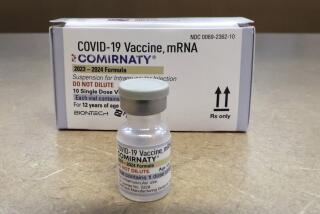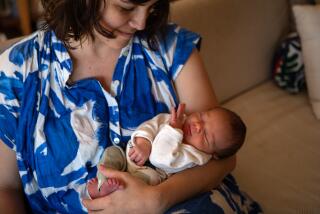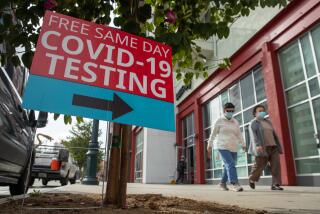Diarrhea Vaccine Is Urged for All Infants
A key federal advisory panel Tuesday recommended that all infants receive a vaccine against the most common form of diarrhea in children.
The vaccine, called RotaTeq, has been shown to prevent life-threatening cases of diarrhea caused by the rotavirus. It is an oral vaccine, administered in three doses.
The advisory panel to the national Centers for Disease Control and Prevention recommended that infants receive their first dose by 12 weeks and all three doses by 32 weeks. The recommendation will become official in a matter of weeks, the CDC said.
Rotavirus is responsible for 55,000 to 70,000 hospitalizations each year and between 20 and 60 deaths. The cost of treating the disease in the U.S. totals $300 million annually.
While the disease is rarely deadly in the U.S., an estimated 500,000 babies die of rotavirus infections in poor countries, where healthcare systems are much weaker.
Developing an effective vaccine has been a top priority for world health officials.
Merck & Co., developer of the vaccine, charges $187.50 for the series of three doses, making it one of the most expensive childhood vaccines.
A CDC analysis showed the cost of immunizing the 4 million infants born in the U.S. each year against rotavirus was higher than the cost of treating them for the disease.
“Given the launch price by Merck, it is very unlikely to be cost-saving,” said CDC epidemiologist Umesh Parashar. But when deciding whether to recommend a childhood vaccine, he said, “economic issues, while important, are secondary.”
The vaccine received Food and Drug Administration approval Feb. 3. It was shown to prevent rotavirus disease in 74% of infants and the most severe illness in 98% of babies.
The advisory panel’s decision all but ensures a large, stable market for the vaccine in the U.S., providing support for an industry that has faced increasing economic problems. Wall Street analysts estimate the vaccine could generate sales of $500 million in the U.S. for Merck by 2010.
Merck has filed for approval of the vaccine in 50 countries in Latin America, Europe and Australia. The New Jersey-based drug company also is in the process of setting up trials in sub-Saharan Africa and Southeast Asia, where many thousands of children die of rotavirus infection.
The recommendation by the CDC panel should clear the way for private insurance coverage of the vaccine. A panel vote on adding RotaTeq to the federal Vaccines for Children Program, which provides free immunizations for youngsters from low-income families, was scheduled for today.
Dr. Robert Frenck Jr., a pediatrician in Torrance, said he would recommend the vaccine to his patients. But he worried about the rising cost of childhood immunizations, which now exceed $1,000 per child for all recommended vaccinations, he said.
“That’s a fair amount of money for parents who don’t have insurance,” he said.
Moreover, rising costs to insurers will inevitably be passed on to patients in the form of higher premiums and fees, Frenck said. “The economics of immunizations are going to become an issue,” he said.
Despite the unanimous recommendation from the CDC Advisory Committee on Immunization Practices, the vaccine faces some challenges in winning acceptance from parents.
An earlier vaccine, RotaShield, was withdrawn in 1999 because it caused a serious bowel problem called intussusception, an obstruction that occurs when the intestine folds on itself. Although the condition can occur naturally, it showed up more often in infants receiving RotaShield, which was developed by drug maker Wyeth.
In Merck’s clinical trials, among the largest ever for a childhood vaccine, blockages did not turn up at an abnormal rate. Of the 34,000 babies receiving the vaccine, 12 got the intestinal blockage compared to 15 of 34,000 babies on a placebo.
“We looked at this very carefully and found no evidence” that RotaTeq could cause blockages, said the CDC’s Parashar.
More to Read
Sign up for Essential California
The most important California stories and recommendations in your inbox every morning.
You may occasionally receive promotional content from the Los Angeles Times.










